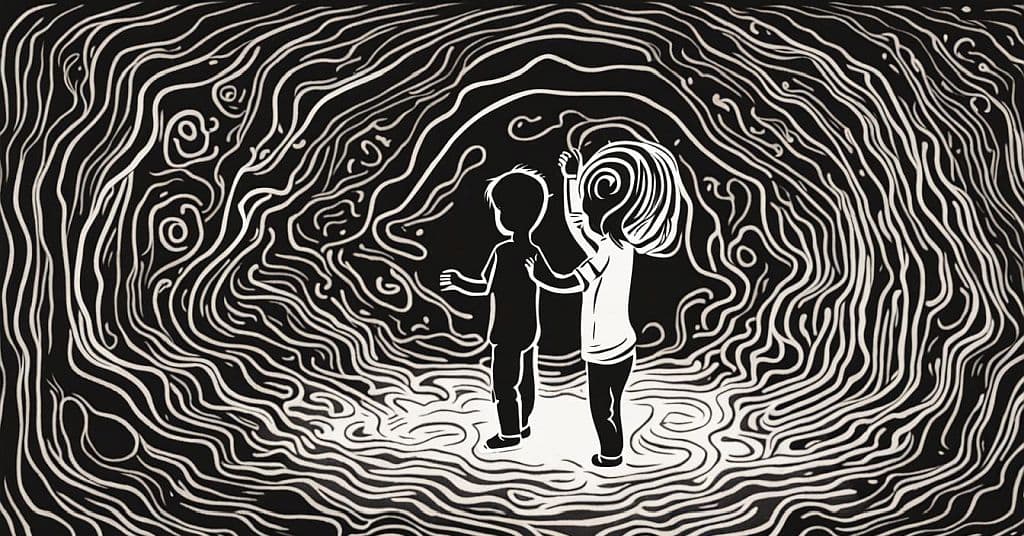 From a British anthology television series to Richard Grannon.
From a British anthology television series to Richard Grannon.
Symbology of Black Mirror #
What are the symbologies and narratives around “black mirror”? #
“Black Mirror,” a British anthology television series created by Charlie Brooker, is renowned for its exploration of contemporary socio-technological themes, often presenting dystopian or cautionary tales. The symbologies and narratives in “Black Mirror” are multifaceted, reflecting a complex interplay of technology, society, and human psychology.
Technology as a Double-Edged Sword: The title “Black Mirror” itself is symbolic, referring to the reflective screens of our electronic devices. It suggests that these devices are mirrors reflecting our own nature and society back at us. The series frequently explores how technology, while offering incredible benefits, can also amplify human frailties and societal issues, leading to unintended and often disturbing consequences.
Dystopian Visions and Societal Critique: Many episodes present dystopian scenarios where technology has altered societal structures and human interactions. These narratives often serve as critiques of current social trends, such as the obsession with social media status (“Nosedive”), the erosion of privacy (“The Entire History of You”), and the dehumanizing effects of entertainment and spectacle (“White Bear”).
Moral and Ethical Dilemmas: “Black Mirror” excels in presenting complex moral and ethical quandaries. For instance, “The Entire History of You” delves into the ethics of memory and privacy, while “Be Right Back” explores the implications of artificial replication of human consciousness. These narratives force viewers to confront uncomfortable questions about the nature of self, identity, and morality in a technologically advanced world.
Human Psychology and Behavior: Despite its focus on technology, the series is deeply rooted in exploring human psychology. It examines how technology can exacerbate human vulnerabilities, fears, and desires. The technology in “Black Mirror” often acts as a catalyst that reveals deeper psychological and emotional truths about its characters.
Isolation and Disconnection: A recurring theme in the series is the paradox of technology as a tool for both connection and isolation. Many episodes depict characters who are physically and emotionally isolated due to their reliance on or obsession with technology, highlighting the irony of increased connectivity leading to greater disconnection from real human experiences.
Power Dynamics and Surveillance: The narrative often delves into the power dynamics between individuals, society, and technology. Episodes like “The National Anthem” and “Hated in the Nation” explore the themes of political power, public opinion, and surveillance, offering a critique of how technology can be used to manipulate and control populations.
Reflection of Contemporary Anxieties: “Black Mirror” serves as a reflection of contemporary anxieties about the future of technology and its impact on society. Each episode can be seen as a standalone parable that taps into current fears and debates about the role and influence of technology in our lives.
In summary, “Black Mirror” uses its narratives and symbologies to offer a profound commentary on modern society and technology. It holds up a ‘black mirror’ to viewers, forcing them to confront the darker aspects of technological advancement and its implications for human nature and societal structures. The series operates as a modern form of speculative fiction, using allegory and metaphor to explore and critique contemporary issues in a deeply thought-provoking manner.
And outside of the TV series, what is the context Richard Grannon uses this syntagma? #
Richard Grannon, a life coach and personal development expert, uses the term “Black Mirror” in a context that diverges significantly from the television series. In his work, Grannon often focuses on psychological resilience, emotional trauma, and recovery from narcissistic abuse. The “Black Mirror” in his context is likely to symbolize the following:
Reflection of Inner Self: In psychological and therapeutic contexts, a “black mirror” might represent a tool for introspection and self-reflection, particularly focusing on the darker, often ignored or repressed aspects of one’s psyche. This can be related to shadow work in Jungian psychology, where the ‘shadow’ represents the unconscious part of the personality which the conscious ego does not identify in itself.
Projection and Narcissism: Grannon’s emphasis on narcissistic abuse suggests that the “Black Mirror” could symbolize how narcissists project their negative traits onto others. This mirror does not reflect the true self of the person being targeted but rather the distorted perceptions and negative qualities of the abuser.
Distortion of Reality: In therapeutic terms, a “Black Mirror” might also represent the distorted reality created by emotional or psychological abuse. This can include gaslighting, where the victim’s perception of reality is manipulated, leading to confusion and self-doubt.
Confrontation with Trauma: The use of the term could also imply confronting and reflecting upon one’s traumatic experiences. This aligns with Grannon’s focus on recovery from trauma and abuse, where reflecting on painful experiences is a crucial step towards healing.
Awareness and Recovery: Finally, Grannon might use the “Black Mirror” to symbolize the journey towards self-awareness and recovery. This involves recognizing and understanding the impact of emotional trauma and narcissistic abuse and working through these issues to achieve personal growth and healing.
In summary, in Richard Grannon’s usage, “Black Mirror” likely denotes a metaphorical tool for psychological introspection and healing, especially in the context of recovering from narcissistic abuse and emotional trauma. It represents a medium for self-reflection, understanding the impact of negative experiences, and embarking on a path towards healing and personal development.